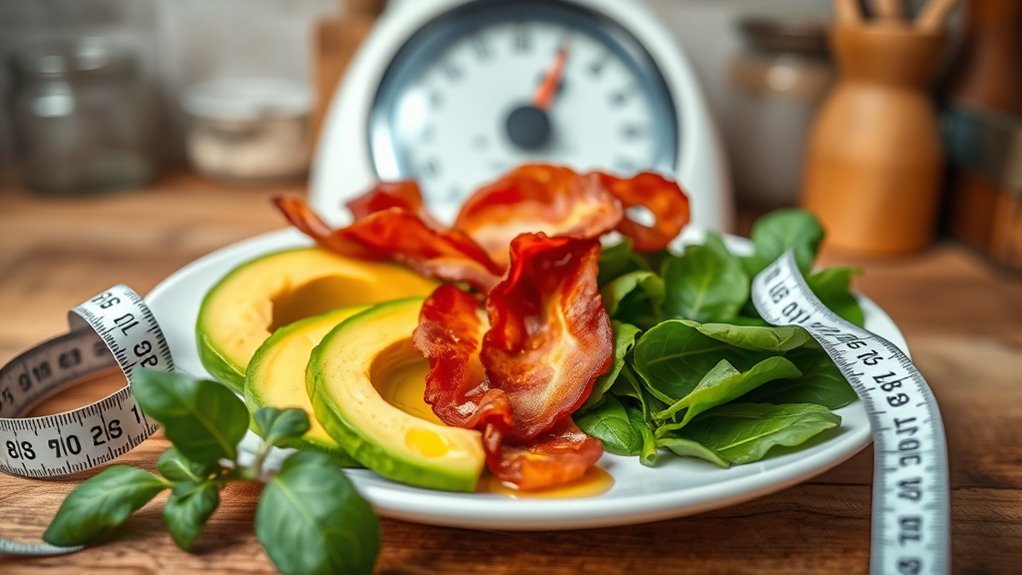If you’re not losing weight on the keto diet, it might be due to hidden carbs, not eating enough protein, or overeating healthy fats. These factors can stall your progress. Also, dehydration and lack of exercise play a role. Hormonal changes and stress can further complicate your situation. It’s crucial to track your food intake accurately and recognize when you hit a plateau. Understanding these challenges can help you get back on track and achieve your goals.
Hidden Carbs in Your Diet

Even if you think you’re sticking to the keto diet, hidden carbs can sneak into your meals and derail your progress. Often, sneaky snacks like certain nuts or sauces contain hidden sugar that can surprise you. It’s essential to become familiar with various carbohydrate sources, as they can be lurking in your favorite foods. Always check food labels for unexpected ingredients, and pay attention to portion sizes, as they can add up quickly. When meal planning, prioritize whole foods and be mindful of ingredient awareness. Dining out can be tricky too—ask about sauces and dressings that may contain hidden carbs. By staying vigilant, you can maintain your keto lifestyle and enjoy the freedom it brings.
Insufficient Protein Intake

While you might be focusing on cutting carbs, insufficient protein intake can hinder your weight loss on the keto diet. Protein is essential for maintaining muscle mass and supporting metabolic functions, which are vital for effective weight loss. If you’re not consuming adequate protein sources like meat, fish, eggs, or plant-based options, your body may not efficiently burn fat. Additionally, protein timing can play a significant role; spreading your protein intake throughout the day helps keep your metabolism active and prevents muscle breakdown. Aim for a balanced intake that aligns with your energy needs and workout schedule. By ensuring you’re getting enough protein, you can empower your weight loss journey and achieve the freedom you desire with the keto diet.
Overeating Healthy Fats

Although the keto diet emphasizes healthy fats as a primary energy source, overeating them can actually stall your weight loss efforts. It’s crucial to practice portion control and engage in mindful eating to truly benefit from a high-fat diet. Remember, even healthy fats can lead to excess calorie intake if you’re not careful. Here’s a quick guide to help you manage your fats:
| Food Type | Serving Size | Calories per Serving |
|---|---|---|
| Avocado | 1 medium | 240 |
| Olive Oil | 1 tablespoon | 120 |
| Almonds | 1 ounce | 160 |
| Coconut Oil | 1 tablespoon | 120 |
| Cheese | 1 ounce | 110 |
Stay aware of your portions, and you’ll keep your weight loss journey on track!
Dehydration and Electrolyte Imbalance
Staying hydrated is essential on the keto diet, as your body often excretes more water and electrolytes during this shift. If you’re not managing your electrolyte levels, you might experience symptoms like fatigue, cramps, or headaches, which can hinder your weight loss efforts. Addressing dehydration and ensuring proper electrolyte balance can help you feel better and support your weight loss journey.
Importance of Hydration
How often do you consider the role of hydration in your weight loss journey on the keto diet? Staying properly hydrated is essential, especially since keto can lead to increased water loss. When you don’t drink enough water, you might experience fatigue, headaches, or cravings, which can sabotage your efforts. The hydration benefits extend beyond just feeling good; adequate water intake helps optimize metabolism and supports fat breakdown. It also aids in appetite control, making it easier to stick to your meal plan. By prioritizing your hydration, you’re giving yourself the freedom to function at your best and enhance your weight loss results. So, grab that water bottle and drink up—your body will thank you!
Managing Electrolyte Levels
One essential aspect of the keto diet that often gets overlooked is managing your electrolyte levels. When you reduce carbs, your body releases excess water, leading to dehydration and potential electrolyte imbalances. This can cause symptoms like fatigue, headaches, and muscle cramps. To maintain proper electrolyte balance, focus on consuming adequate sodium, potassium, and magnesium. Incorporating mineral supplementation can be beneficial, especially during the initial stages of the diet. Foods like avocados, leafy greens, and nuts are great sources of these essential minerals. Remember, staying mindful of your electrolyte levels not only supports your weight loss journey but also enhances your overall well-being. Embrace this knowledge, and you’ll feel more energized and empowered on your keto path.
Lack of Physical Activity
If you’re not seeing the weight loss results you expect on the keto diet, your level of physical activity could be a key factor. A sedentary lifestyle can greatly hinder your progress, as exercise plays an essential role in enhancing the benefits of keto. Combining regular physical activity with your dietary changes can create a powerful synergy that supports your weight loss goals.
Sedentary Lifestyle Impact
Although you may be following the keto diet strictly, a sedentary lifestyle can greatly hinder your weight loss efforts. Sedentary habits, like sitting for long periods, slow your metabolism and reduce calorie burn, making it tough to see results on the scale. Even with a well-planned diet, lifestyle changes that incorporate more movement can enhance your progress. Engaging in regular physical activity not only helps burn calories but also improves your overall well-being and energy levels. Consider small adjustments, like walking during breaks or taking the stairs, to combat inactivity. By breaking free from sedentary routines, you’ll empower yourself to optimize the benefits of your keto journey and achieve your weight loss goals.
Exercise and Keto Synergy
Incorporating exercise into your keto lifestyle can greatly enhance your weight loss results. By adding physical activity, you’ll not only boost your metabolic rate but also maximize the benefits of your diet. Here’s how focusing on exercise can help:
- Diverse exercise types keep you engaged and motivated.
- Higher workout intensity can accelerate fat loss.
- Cardio benefits improve heart health and endurance.
- Strength training builds muscle, which burns more calories at rest.
- Consistent fitness routines promote sustainable weight loss.
Prioritizing exercise frequency and activity variety helps with muscle recovery and keeps your body adapting. Consistency is key—find routines you enjoy, and watch how they synergize with your keto journey for a freer, healthier you!
Hormonal Changes and Stress
While you’re following the ketogenic diet, hormonal changes and stress can greatly impact your weight loss journey. Hormonal imbalances, often triggered by stress, can hinder your progress and make it harder to shed those pounds. Cortisol, the stress hormone, can increase cravings and fat storage, creating a challenging cycle. Focusing on stress management techniques, like mindfulness, yoga, or deep breathing exercises, can help restore hormonal balance and support your weight loss efforts. Remember, your body’s response to stress is unique, so find what works best for you. By addressing these factors, you’ll create a more supportive environment for your body to thrive, making your journey toward freedom from unwanted weight much more achievable.
Inaccurate Tracking of Food Intake
Stress management is essential for your overall well-being, but it’s only one piece of the puzzle when it comes to weight loss on the keto diet. One major hurdle you might face is inaccurate tracking of food intake. If you’re not precise, you could easily consume more carbs or calories than you realize.
- Misjudging portion sizes
- Overlooking food labels
- Underestimating snacks or condiments
- Ignoring hidden carbs in processed foods
- Failing to log everything consistently
To achieve your weight loss goals, pay close attention to what you eat. Use a food diary or app to track your intake accurately. This approach helps guarantee you’re staying within your keto parameters, giving you the freedom to enjoy your journey.
Plateauing After Initial Weight Loss
As you commence your keto journey, you might find that after an initial drop in weight, the scale suddenly stalls, leaving you frustrated and unsure of what to do next. This phenomenon is common and often results from metabolic adaptation, where your body adjusts to a new calorie intake, leading to weight loss stalls.
| Possible Causes | Signs | Solutions |
|---|---|---|
| Reduced Caloric Deficit | Consistent weight | Adjust macros |
| Stress & Sleep Issues | Fatigue | Prioritize sleep |
| Hormonal Changes | Cravings | Consult a doctor |
Understanding these factors can help you break through that plateau. Remember, plateaus are a normal part of the journey, so don’t lose hope!
Frequently Asked Questions
1. Why am I not losing weight on the keto diet?
Weight loss on the keto diet can be affected by various factors including calorie intake, hidden carbs, and hormonal imbalances. Ensure you’re tracking your daily calorie intake and not exceeding your limits. Additionally, some foods labeled as keto-friendly may still contain hidden carbohydrates. Hormonal issues, such as insulin resistance or thyroid problems, can also hinder weight loss. Consult a healthcare professional for personalized advice.
2. Am I eating too much protein on the keto diet?
Yes, consuming too much protein can kick your body out of ketosis. The keto diet is designed to be high in fat and low in carbohydrates, with a moderate amount of protein. When protein intake is too high, your body may convert excess protein into glucose through a process called gluconeogenesis, which can hinder fat burning. Aim for a balanced macronutrient ratio that aligns with keto guidelines.
3. Could I be experiencing the keto plateau?
Absolutely, the keto plateau is a common occurrence where weight loss stalls after an initial period of success. This can happen due to several reasons like metabolic adaptation, loss of water weight, or caloric intake adjustment. To overcome this plateau, consider varying your calorie intake, increasing physical activity, or cycling your carbohydrates temporarily to re-stimulate fat loss.
4. Are there any hidden carbs that I should be aware of?
Yes, many foods marketed as keto-friendly can contain hidden carbohydrates. These include sauces, dressings, and even some vegetables. Always read labels carefully and be mindful of portion sizes. Foods like nuts, dairy products, and certain vegetables can add up quickly in carbs if consumed in large amounts. Keeping a food diary can help you stay accountable for your carb intake.
5. Is stress affecting my weight loss on the keto diet?
Yes, stress can significantly impact weight loss efforts. When you’re stressed, your body produces cortisol, a hormone that can lead to increased fat storage and cravings for high-carb foods. Managing stress through techniques like mindfulness, yoga, or regular exercise can help improve your overall well-being and support your weight loss goals on the keto diet.
References
- https://www.ncbi.nlm.nih.gov/pmc/articles/PMC7071261/
- https://www.healthline.com/nutrition/keto-diet-weight-loss
- https://www.verywellfit.com/why-you-arent-losing-weight-on-keto-5192652
- https://www.cdc.gov/healthyweight/losing_weight/index.html
- https://www.hhs.gov/fitness/eat-healthy/nutrition/index.html
- https://www.bbc.com/future/article/20210120-why-diets-fail-and-how-to-make-them-work
- https://www.mayoclinic.org/healthy-lifestyle/nutrition-and-healthy-eating/expert-answers/keto-diet/faq-20455050


